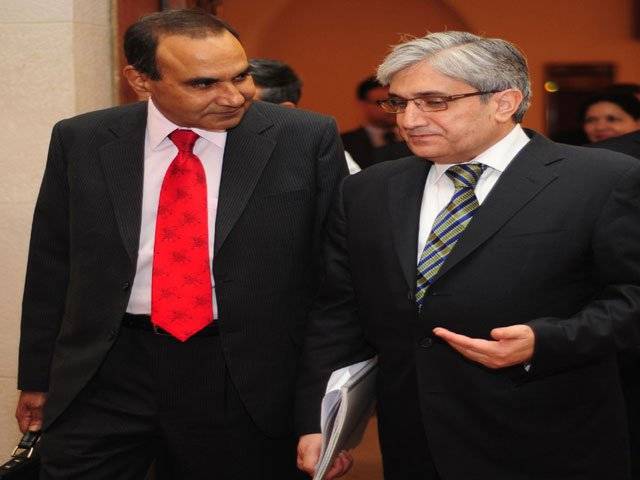ISLAMABAD - Talks between Pakistan and India on the Tulbul Navigation Project (Wullar Barrage) were derailed on Thursday after the Indian team walked out. Indian Water Resources Secretary Dhruv Vijay Singh led his delegation while Power and Water Secretary Javed Iqbal led the Pakistan team. The talks were held to discuss Pakistans objection to Indias plans to build a barrage across the Jhelum River at the mouth of Wullar Lake. Thirteen rounds of talks have been held on the project so far but the issue remains unresolved. Indian secretary Dharwajay Singh said that India has the right to build the Wullar Barrage project under all conditions but a change in its structure or design can be discussed if Pakistan agrees. India has also demanded the right to channel transportation between Baramulla and Srinagar. Pakistans Water and Power secretary Javed Iqbal said that the construction of Wullar Barrage is not acceptable other than the framework laid out in the Indus Water Treaty. He also said Pakistan will not accept any project of India which may result in Indian control over the River Jhelum water. Sources said that Pakistan has firmed up its case to challenge another project being built by India on the Indus River in violation of the 1960 Indus Water Treaty. However, the Indian secretary said that the barrage is not in violation of the Treaty and will be used only for transportation. The talks are part of the new initiative recently launched by Islamabad and New Delhi to discuss and resolve all outstanding issues between the two south Asian neighbours through a meaningful dialogue process to be completed by July this year. Talks on water disputes have become of greater importance for the two countries largely for the gravity of the situation that many experts believed could push the two nuclear nations to another war in future. Pakistan has been alarmed after India unveiled plans to divert Jhelum River water to the Wullar Barrage to construct a 439-foot long and 12-metre wide navigational lock, and rejected them as a violation of the Indus Water Treaty fearing it would eventually render Pakistan a barren land. After completing the due process Pakistan moved to the International Court of Arbitration on the complaint that Indian plans were in total violation of the Indus Water Treaty and sought appointment of a neutral expert to resolve the issue. Islamabad hopes that New Delhi, while realising gravity of the situation and in the interest of long-term peace and stability in the region, would amicably resolve the water disputes. The Indus Waters Treaty (IWT), a long-standing agreement negotiated by the governments of India and Pakistan and the World Bank was signed in 1960 and is considered the worlds most successful water treaty, having remained relatively intact for 50 years and having withstood four Pak-India wars. However, the Treatys long-term stability is threatened by lack of trust between the two countries as any perceived reduction in water flows magnifies this distrust, whether caused by Indias activities in the Indus Basin or climate change. Historically, India has not made data on water volume in the Indus widely available, impeding efforts to build trust. The number of dams under construction and their management is a source of significant bilateral tension between Pakistan and India. India has 33 projects at various stages of completion on the rivers that affect this region. Currently, the most controversial dam project is the proposed 330-MW dam on the Kishenganga (Neelum) River, a tributary of the Indus (via Jhelum). While studies show that no single dam along the waters controlled by the IWT will affect Pakistans access to water, the cumulative effect of these projects could give India the ability to store enough water to limit the supply to Pakistan at crucial moments in the growing season. In the difficult 60-plus years of bilateral relationship, water has not yet been used in this way, giving rise to demands that Indias water management of the Indus merits scrutiny. Ostensibly, Indias demand for water is rising and water management in India is extremely decentralised and virtually unregulated while its constituent states have limited capacity to coordinate among themselves. Likewise, climate change is expected to increase water scarcity and glacier water is estimated to comprise 30 percent or more of the Indus Rivers flow. Experts believed that if tensions between India and Pakistan related to the Treaty continued to grow, the United States should back relevant supporting institutions that both countries believe could help mitigate conflicts. They thought that the continued peace, stability and success of the IWT are in the national security interests of all stakeholders, including the United States.
Friday, April 19, 2024
Indian team walks out of Wullar Barrage talks

Formula 1 returns to China for Round 5
9:05 PM | April 19, 2024
Germany head coach Julian Nagelsmann extends contract till 2026 World Cup
9:00 PM | April 19, 2024
IMF urges Italy, France to spend less, Germany to loosen purse strings
8:57 PM | April 19, 2024
PM calls UAE president, admires Emirati leadership's response to recent Dubai rains
8:55 PM | April 19, 2024
Church leader calls for including Christians in Gandhara Corridor
8:50 PM | April 19, 2024
A Tense Neighbourhood
April 19, 2024
Dubai Underwater
April 19, 2024
X Debate Continues
April 19, 2024
Hepatitis Challenge
April 18, 2024
IMF Predictions
April 18, 2024
Kite tragedy
April 19, 2024
Discipline dilemma
April 19, 2024
Urgent plea
April 19, 2024
Justice denied
April 18, 2024
AI dilemmas unveiled
April 18, 2024
ePaper - Nawaiwaqt
Advertisement
Nawaiwaqt Group | Copyright © 2024





